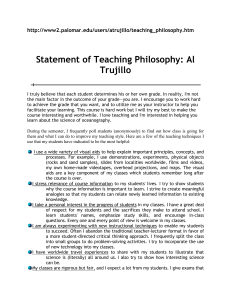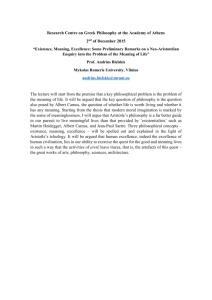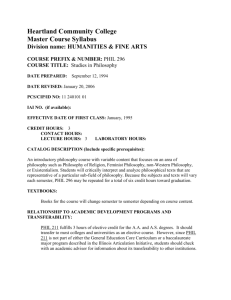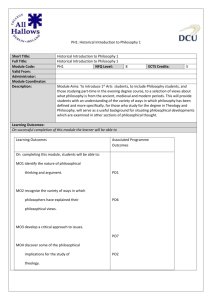Women and Philosophy
advertisement
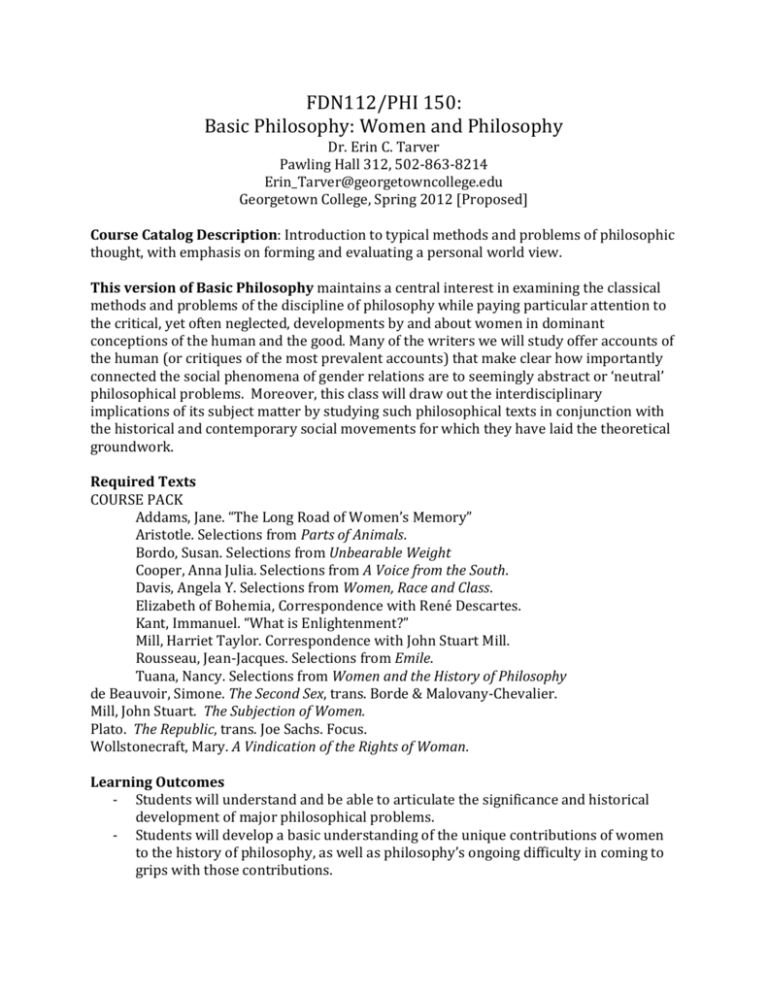
FDN112/PHI 150: Basic Philosophy: Women and Philosophy Dr. Erin C. Tarver Pawling Hall 312, 502-863-8214 Erin_Tarver@georgetowncollege.edu Georgetown College, Spring 2012 [Proposed] Course Catalog Description: Introduction to typical methods and problems of philosophic thought, with emphasis on forming and evaluating a personal world view. This version of Basic Philosophy maintains a central interest in examining the classical methods and problems of the discipline of philosophy while paying particular attention to the critical, yet often neglected, developments by and about women in dominant conceptions of the human and the good. Many of the writers we will study offer accounts of the human (or critiques of the most prevalent accounts) that make clear how importantly connected the social phenomena of gender relations are to seemingly abstract or ‘neutral’ philosophical problems. Moreover, this class will draw out the interdisciplinary implications of its subject matter by studying such philosophical texts in conjunction with the historical and contemporary social movements for which they have laid the theoretical groundwork. Required Texts COURSE PACK Addams, Jane. “The Long Road of Women’s Memory” Aristotle. Selections from Parts of Animals. Bordo, Susan. Selections from Unbearable Weight Cooper, Anna Julia. Selections from A Voice from the South. Davis, Angela Y. Selections from Women, Race and Class. Elizabeth of Bohemia, Correspondence with René Descartes. Kant, Immanuel. “What is Enlightenment?” Mill, Harriet Taylor. Correspondence with John Stuart Mill. Rousseau, Jean-Jacques. Selections from Emile. Tuana, Nancy. Selections from Women and the History of Philosophy de Beauvoir, Simone. The Second Sex, trans. Borde & Malovany-Chevalier. Mill, John Stuart. The Subjection of Women. Plato. The Republic, trans. Joe Sachs. Focus. Wollstonecraft, Mary. A Vindication of the Rights of Woman. Learning Outcomes - Students will understand and be able to articulate the significance and historical development of major philosophical problems. - Students will develop a basic understanding of the unique contributions of women to the history of philosophy, as well as philosophy’s ongoing difficulty in coming to grips with those contributions. - Students will develop basic skills in analyzing and critiquing complex philosophical arguments and texts. Students will develop basic skills in verbally communicating philosophical positions and in using collaborative discussions to advance philosophical knowledge. Students will develop basic skills in critiquing their own and others’ philosophical writing. Students will understand and be able to articulate the applicability of philosophical reasoning to contemporary life, particularly to issues in gender justice. Grading Exams (2) Term Paper Discussion Participation Group Project Paper Workshop Reading Quizzes (10) 30% 25% 15% 10% 10% 10% Grading Scale 92 – 100 = A 87 – 92 = A/B 82 – 87 = B 77 – 82 = B/C 70 – 77 = C 60 – 70 = D < 60 = F Assignments Quizzes Each day, you will have assigned reading that needs to be done before you come to class. There will be unannounced reading quizzes (on that day’s assigned material) over the course of the semester, the highest 10 of which will be counted toward your grade. Note that I do not schedule make-up quizzes unless you are absent for an official university event (athletics, debate, etc.) or documented illness. Exams There will be two exams in this class: a mid-term and a final. All exams are cumulative. Missed exams may only be made up in the case of an absence for an official university event or documented illness. Term Paper Think of this as an opportunity to be a philosopher yourself. Now, you’ll learn over the course of the semester that this is more difficult than it sounds, and involves much, much more than just stating your opinions or writing in over-the-top, flowery prose. A good philosophy paper does two things: it clearly and accurately describes the details of the philosophical argument that is its topic, and it clearly and persuasively offers a wellreasoned, critical position on that topic. A good paper in this particular course will also address in some way the general theme of women and philosophy. As the term moves along, I’ll offer more detailed instructions on crafting, drafting, and re-writing (yes!) your paper. In general, it is important to note that this paper will require the most independent thought on your part than any other assignment in this course, and will absolutely not be done well if left to the last minute. Thus, you’ll do this work in stages, which will include a draft conference with me. Discussion Participation Because Philosophy is best done conversationally, it’s incredibly important that everyone in this class think of themselves as semester-long conversation partners, rather than simply as students who come to sit in (or, heaven forbid, hide in the back of) class. It’s also important to note that the best conversations happen when we all take care to prepare for them—which means that your job in this class is not just to speak up, but to come prepared (i.e., having done the reading) to contribute helpfully to our general classroom experience. Thus, to get good marks in this component, you’ll need to do the following things: - Come to class regularly, and do not miss more than 3 classes. - Contribute positively to the general class discussion - Complete one day of Begin The Discussion duties - Abide by the Classroom Conduct policy (see below) Group Project: Applied Philosophy In the course of our reading of each major text this semester, one group will be responsible for giving a presentation or leading an activity that demonstrates how that text and its ideas might be usefully applied to contemporary life today, particularly in issues related to the place of women in contemporary society. Unconventional presentations or activities are encouraged; the only restriction is that your presentation/activity should take between 20 and 30 minutes. Schedule Week 1: What is Philosophy? Why “Women and Philosophy”? –Kant, Wollstonecraft Week 2-4: Women, Philosophy and the Ancient World –Plato, Aristotle and Tuana Week 5: Elizabeth of Bohemia and René Descartes Week 6: Rousseau and Wollstonecraft Week 7: Wollstonecraft, contd. Week 8-10: Harriet Taylor Mill and John Stuart Mill Week 11: Anna Julia Cooper, Jane Addams and Education for Social Justice Week 12: Beauvoir and the movement for “Women’s Liberation” Week 13: Beauvoir, Bordo & What is it Like to Be a Woman in Philosophy? [blog] Week 14: Beauvoir, Davis, and the Collegium of Black Women Philosophers Week 15: Epistemology, Group Identities and Women in American Politics Classroom Conduct We’re going to talk quite a bit about arguments in this class—and we’ll definitely have a few of our own!—but that doesn’t mean that we don’t have ground rules. In fact, being respectful of one another, even when we disagree, is absolutely crucial to making this an environment in which everyone can learn. There are several ways we can show one another respect; the following are the ones I insist upon: - We may attack ideas, but never people. Listen to others when they’re talking. Don’t use cell phones or computers in the classroom. Any other ground rules we agree upon as a group Academic Honesty Academic Honesty is extremely important, and so violations of the Georgetown College Honor System will not be tolerated. I will not hesitate to fail a student for the course for such violations. Infractions of the Honor System include plagiarism, cheating, stealing, and lying related to academic matters. Definitions of these infractions are available in the Georgetown College Student Handbook. Disability Access I encourage any students with disabilities that may impact their access to or performance in any component of this course to talk with me or Disability Support Services as soon as possible. Disability Support Services is located in the Student Wellness Center.

